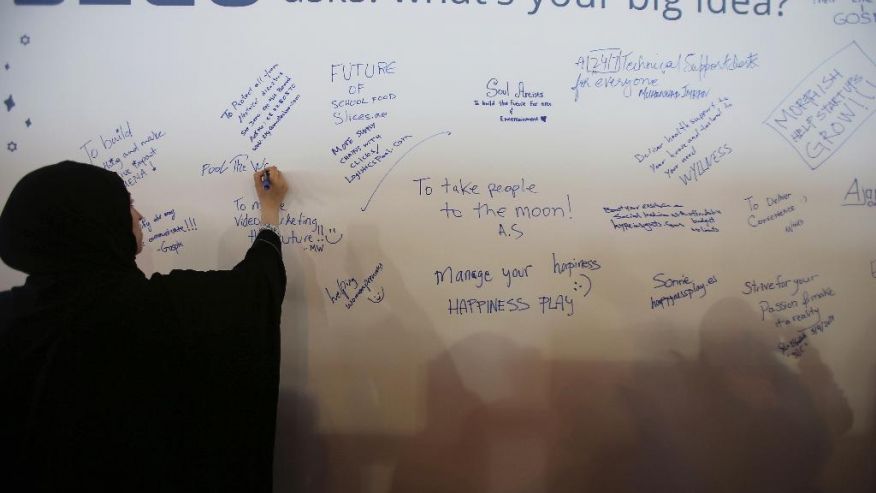-

In this Wednesday, April 5, 2017, photo, a woman writes a note on a board during the opening day of Step 2017 Conference and Music in Dubai, United Arab Emirates. A mobile app to track school buses, Arabic cooking videos on YouTube and even a portable bideu are finding support from governments in the Gulf as a slide in oil prices forces states to cull cushy public sector jobs and look to entrepreneurs to plug the gap. (AP Photo/Kamran Jebreili) (The Associated Press)
DUBAI, United Arab Emirates – A mobile app to track school buses, Arabic cooking videos on YouTube and even a portable bidet are finding support from governments in the Gulf as a slide in oil prices forces states to cull cushy public sector jobs and look to entrepreneurs to plug the gap.
Recent $1 billion valuations of local start-ups Careem, a ride-hailing app, and retailer Souq.com, which was acquired by Amazon in March, have raised interest in the region’s budding entrepreneurship scene. Both companies are headquartered in Dubai, an emirate with futuristic skyscrapers that is working to harness the power of the region’s majority young population with a minister of state for youth affairs who is a mere 22 years old.
Across the Arabian Peninsula, governments — hit hard by a sharp decline in oil prices since 2014 — are competing to attract and keep local entrepreneurs who might provide the region’s next “unicorn,” the industry term for startups that reach a valuation of a billion dollars.
Khaled Talhouni, the managing partner at venture capitalist firm Wamda Capital, says the negative headlines out of the Middle East have tended to overshadow the good, including the growing entrepreneurial spirit.
“There is a huge upswell of entrepreneurial activity happening on the ground, as evidenced by the recent acquisition of Souq by Amazon. And there are hundreds of companies beneath them, following them,” he said.
The Middle East is no Silicon Valley, though. For starters, Talhouni says that unlike the vast single market of the U.S., local entrepreneurs have to grapple with various customs regulations, laws, consumer preferences and norms across nearly two dozen different Arabic-speaking countries to reach the full Middle Eastern market.
Many of the tech startups are finding success by localizing ideas successfully started abroad, from Amazon to Uber.
YallaParking, for example, helps people find and rent parking spots.
“I think it is…

